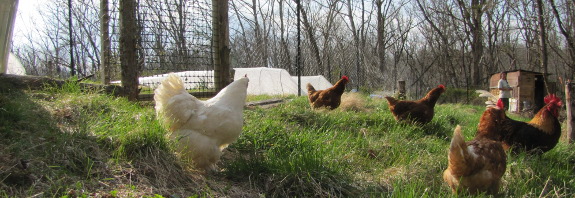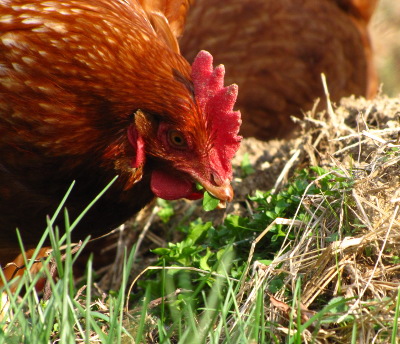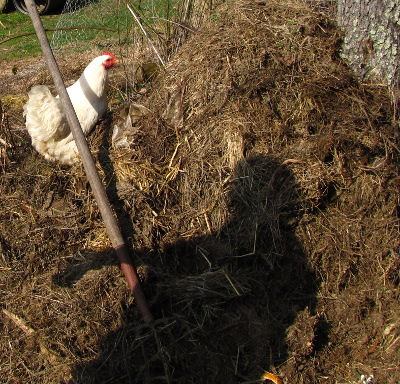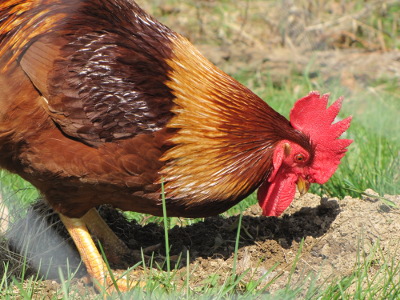
What do chickens eat on pasture?

Doesn't this look
idyllic? Chickens, waist deep in grass. Surely, they are in
bliss.
 Now here's the truth about
what our chickens did when we moved them into their new, sunny
pasture. First, they headed straight for the small patch of bare
earth with chickweed growing in it and snarfed that tender green
down. Next, they ran over to the edges where leaves had drifted
against the fence, providing a damp, protected nook for worms.
Finally, our chickens started scratching through that one bare earth
patch looking for more worms. They didn't eat the grass.
Now here's the truth about
what our chickens did when we moved them into their new, sunny
pasture. First, they headed straight for the small patch of bare
earth with chickweed growing in it and snarfed that tender green
down. Next, they ran over to the edges where leaves had drifted
against the fence, providing a damp, protected nook for worms.
Finally, our chickens started scratching through that one bare earth
patch looking for more worms. They didn't eat the grass.
I posted over on our
chicken blog about plants
grown in traditional chicken pastures. Most poultry farmers
are using their pasture as a source of vitamins and minerals and don't
expect their flock to get much nutrition from pasture, so they plant a
mixture of forage grasses, grains, legumes, and (occasionally) other
broadleaf plants. We're looking for a pasture that will feed our
flock a significant portion of their daily nutrition, so we're going to
have to think outside the box.
 I plant to continue to grow grains
and legumes in our
original two paddocks, in hopes of storing up some chicken feed for the
winter. I have winter
wheat growing in one
paddock where I have also interseeded clover, and will be planting the
other paddock in oats, clover, and field peas now that the chickens
have moved out. In May, I'll add in amaranth, millet, alfalfa, sunflowers, cowpeas, and corn, and will
round out the year with a late crop of wheat and rye. I suspect
I'll be able to graze the chickens in those paddocks once the grains
are tall, but I don't think the chickens will get much food value
(until I feed them the fruits in the winter, of course.)
I plant to continue to grow grains
and legumes in our
original two paddocks, in hopes of storing up some chicken feed for the
winter. I have winter
wheat growing in one
paddock where I have also interseeded clover, and will be planting the
other paddock in oats, clover, and field peas now that the chickens
have moved out. In May, I'll add in amaranth, millet, alfalfa, sunflowers, cowpeas, and corn, and will
round out the year with a late crop of wheat and rye. I suspect
I'll be able to graze the chickens in those paddocks once the grains
are tall, but I don't think the chickens will get much food value
(until I feed them the fruits in the winter, of course.)
The rest of our pastures
are going to be wilder, and I suspect my plans for them will change
drastically as I continue to observe what our chickens like to
eat. In at least one pasture, I'd like to experiment with letting
the grass grow tall to see if the prairie-like environment attracts
enough bugs to keep the chickens happy. Elsewhere, I want to let
the chickens scratch bare patches to promote the more weedy plants they
enjoy. In addition to chickweed, tick-trefoil seems to be a favorite of
our flock, and I need to put some thought into how to get this weed to
take over their pastures.
 Our chickens are big fans of
fruit, not only because the hens like the sweet, succulent food
themselves, but also because insects are attracted to the sugar.
I've planted an everbearing
mulberry and some bush
cherries in one pasture, but it will be several years until that
experiment pays off. I'm also working on collecting and starting
seeds from persimmons that fruit all the way from
early fall to mid winter. Meanwhile, I'll plant ground
cherries in some of
our pastures since our chickens were happily eating those fruits in
February.
Our chickens are big fans of
fruit, not only because the hens like the sweet, succulent food
themselves, but also because insects are attracted to the sugar.
I've planted an everbearing
mulberry and some bush
cherries in one pasture, but it will be several years until that
experiment pays off. I'm also working on collecting and starting
seeds from persimmons that fruit all the way from
early fall to mid winter. Meanwhile, I'll plant ground
cherries in some of
our pastures since our chickens were happily eating those fruits in
February.
 As much as I like to grow
plants, though, I'm starting to realize that chickens are far more
attuned to invertebrates. I'll continue to keep a compost
pile in each active
chicken pasture
since the flock loves to nibble on our food waste and to scratch
through the
decaying organic matter in search of worms. Another way to
attract invertebrates for the chickens is to keep the pasture at least
partially wooded since leaf mulch provides a perfect habitat for worms
and other creepy crawlies --- two of our new pastures for 2011 are
slated to be in existing woodland.
As much as I like to grow
plants, though, I'm starting to realize that chickens are far more
attuned to invertebrates. I'll continue to keep a compost
pile in each active
chicken pasture
since the flock loves to nibble on our food waste and to scratch
through the
decaying organic matter in search of worms. Another way to
attract invertebrates for the chickens is to keep the pasture at least
partially wooded since leaf mulch provides a perfect habitat for worms
and other creepy crawlies --- two of our new pastures for 2011 are
slated to be in existing woodland.
 I'm starting to suspect that
the best chicken pasture doesn't look anything like the pastoral scene
most of us would envision. It probably has some green grass and
clover, patches of weeds, bits of bare earth, trees, shrubs, and
perhaps other factors I've yet to discover. I'll be posting our
weekly observations of chicken pasture year two over on our chicken blog, but will be sure to sum up
over here in the fall or winter for those of you who are just
interested in the big picture. I hope some of you will be
inspired to give chicken pasturing a try on your own farm and will
report your observations as well.
I'm starting to suspect that
the best chicken pasture doesn't look anything like the pastoral scene
most of us would envision. It probably has some green grass and
clover, patches of weeds, bits of bare earth, trees, shrubs, and
perhaps other factors I've yet to discover. I'll be posting our
weekly observations of chicken pasture year two over on our chicken blog, but will be sure to sum up
over here in the fall or winter for those of you who are just
interested in the big picture. I hope some of you will be
inspired to give chicken pasturing a try on your own farm and will
report your observations as well.
 This post is part of our Chicken Pasture lunchtime series.
Read all of the entries: This post is part of our Chicken Pasture lunchtime series.
Read all of the entries: |
Want more in-depth information? Browse through our books.
Or explore more posts by date or by subject.
About us: Anna Hess and Mark Hamilton spent over a decade living self-sufficiently in the mountains of Virginia before moving north to start over from scratch in the foothills of Ohio. They've experimented with permaculture, no-till gardening, trailersteading, home-based microbusinesses and much more, writing about their adventures in both blogs and books.
Want to be notified when new comments are posted on this page? Click on the RSS button after you add a comment to subscribe to the comment feed, or simply check the box beside "email replies to me" while writing your comment.

I have nothing to say really -- great post -- if there was a "like" button, I'd "like" it.
Very smoothly incorporated plug for the chicken waterer at the end of the post, too. lol.
I love the permaculture-ness of having compost piles in various places so the chickens can pick through scraps. And even if they aren't eating all the long, waist-deep grass we saw them waddling through, I'm sure they're much more peaceful and content as they feel that grass brushing against their l'il chicken legs as they run to get chickgrass, and bare dirt, and worms, etc. You're reating chicken nirvana over there!
I heard that podcast on your friennd's site -- I hadn't realised it was so long but once you guys got going, it was so interesting to hear and I ended up listening to the whole thing. Thanks for that!!
but once you guys got going, it was so interesting to hear and I ended up listening to the whole thing. Thanks for that!!
Cheers!
Thanks for your kind words! I appreciate that no one complains about my plugs for our chicken waterers --- they pay the bills so that I can regale you with so many long posts.
I agree with you about the enjoyment factor of long grass. Even if the chickens don't get anything but pleasure from the grass, it's worth it!
I was really interested to see you comment that the chickens don't eat grass. Perhaps it is because they are spoiled for choice?... or the type of grass does not appeal?
I have experienced that chickens can decimate a lawn in no time. I planted out a lawn for someone in a settlement camp to pretty up their place a little and the next time I visited she was so embarrassed for me to see that her chickens had completely destroyed all the effort. Even the roots were dug up and eaten.
The grass used was kikuyu [I am in South Africa]. I have yet to get my chickens because my last ones all got eaten by predators in various shapes and sizes.... including 2 legged ones... so I am building up a strong and safe structure permaculture style before getting more.
I like what you are doing with pasture... fascinating reading. Thanks for sharing all that you try and what has worked... so helpful.
Chelle --- very good observations! I wonder if the chickens actually ate the grass or scratched it up to get at bugs in the ground? When I watch our chickens, they usually seem to be doing the latter, but I have seen them nibble on a new green leaf now and then. Even without eating the grass, they decimate it pretty fast.
Since chickens aren't ruminants, they don't have the stomach capacity to get much nutrition out of grass --- the grass is just too high in cellulose to be broken down into useful compounds. New, tender shoots are another story --- anything that tastes sweet to us when we nibble on it is probably yummy for a chicken. Of course, insects are even more up their alley.
Good luck with your chicken experiments! They sound fascinating!
It must be the Kikuyu then... edible more than other grasses. They definitely went after the grass. Interesting. I had just assumed all grasses would be eaten because of this experience I described to you.
I know it is also available in Hawaii. Went looking now to see if anything else on the net about it.....
Found:
http://www.ctahr.hawaii.edu/oc/freepubs/pdf/LM-5.pdf
http://www.feedmeright.co.nz/pdf/OrganicNZ_BackyardChooks.pdf
In the second pdf they mention chickens cleaning up Kikuyu. It is quite a succulent grass.I want to edge my chicken run with it as forage and bug habitat. Can only experiment and see... might have to protect it a bit.
I have been designing a permaculture style chicken system which I uploaded on my blog today. It may interest you. Any comments with your experience would be invaluable to me. This is as yet untried and merely the product of much research. I have kept chickens before but not in this way. Blog post is here... http://edenparadigm.com/planning-for-chickens-the-permaculture-way... only if of interest. Hope you don't mind. I really appreciate constructive criticism... far less expensive!
You could be right that kikuyu is an unusually tasty grass, but I have to admit that I'm still dubious of the food value the chickens will get out of it. I'd be tempted to try it, but it looks like it's tropical, so I'll just have to wait and see what comes of it in your run!
I like your setup --- lots of pastures for rotation is perfect! I don't see how many chickens you plan to run there, which would be the deciding factor on space, but I like how you decided to move them after the plants are eaten down 30%. Length of rotation is what I'm trying to decide with our hens right now. I'm thinking of leaving them until they've scratched about 50% bare, but just because I want to try out planting some salad green mixes in bare spots to see what the flock thinks of those succulent greens. I hope you'll take lots of pictures and keep good notes! I'll subscribe to your blog so I'm sure to get updates.
Thanks so much for the encouragement, Anna. Really appreciate it. Good to run ideas past someone with realtime experience.
Really appreciate it. Good to run ideas past someone with realtime experience.
I am not really sure how many chickens it will best serve so I thought to start off with a very small flock and just build up until I see what it can carry. I will take lots of pics as I go and post about what is and isn't working.
I got reading more about Kikuyu and there seems to be a lot of conflicting opinion about it. Need to look into it more...
Thanks again.
I finally found a link to your Chicken Blog unfortunately it has "blog" in url so my webfilter blocked it. I think they believe I might try to pick up a few chicks for dinner which is the ultimate goal.
Keep up the good work, I read your blog daily.
We have a pasture raised organic egg farm. When going to redo my pastures this year I found all these "blends" for pasture and all were rubbish. You are exactly right! My birds want broad leaf plants, ecosystems for bugs, fruit falling from trees, and of course Kale.
I appreciate your post and your site. Thanks for taking time to post as I know it's a lot of work!
Blessings on your homestead and family, April Haapala Heron's Nest Farm
I just purchased your Permaculture Chickens book after reading the article on your website. I just wondered if you have any experience with (or know anyone that does) sharing a pasture with both chickens and sheep. I am planning to do mob grazing with my sheep and would like to have the chickens also use the same pasture. But after reading about the different things that chickens like I wonder if they need their own dedicated pastures? Any advice/info/ recommends are appreciated!
Thanks. Theresa